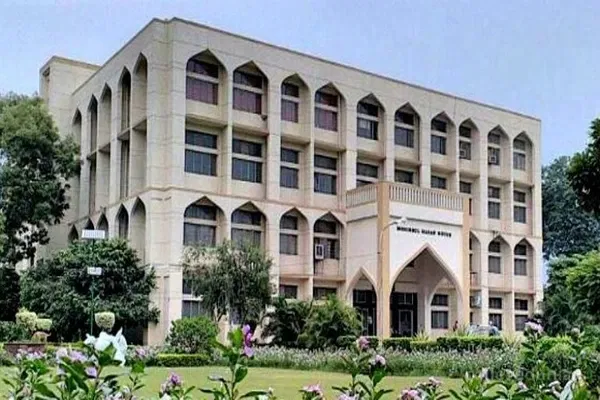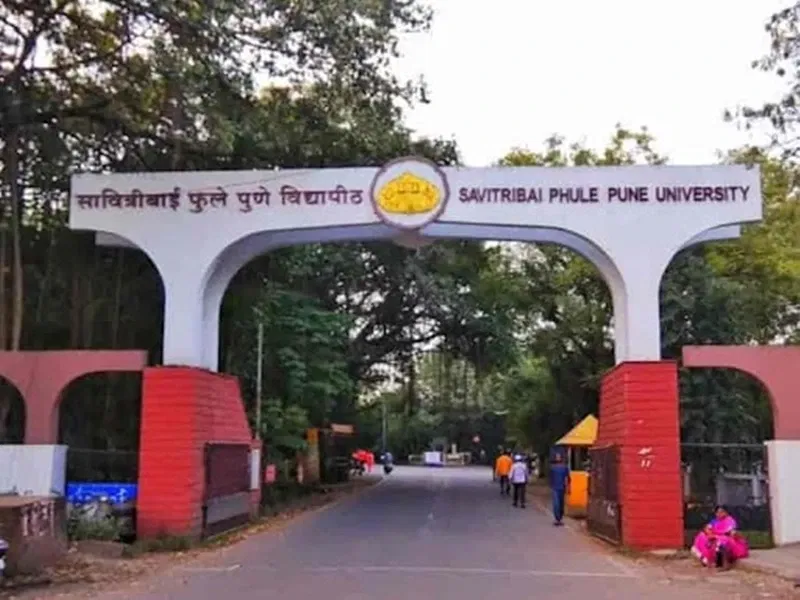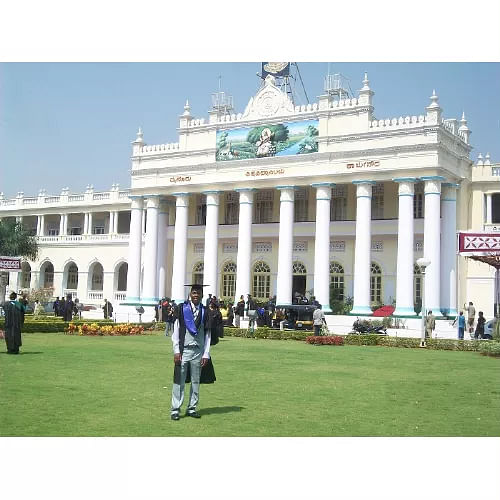LLM (Master of Laws): Course Details, Eligibility, Duration, Fees, Admission
LLM or Master of Laws is a two-year post-graduation course that deals with specialized training in legal practices, where students can gain professional law certification in taxation law, corporate law, etc. LLM graduates have diverse job scopes in various law agencies dealing with numerous clients like international law agencies, taxation agencies, corporate sectors, etc
Table of Contents
- About LLM
- Why Choose LLM?
- Eligibility Criteria for LLM
- How To Get Admission to LLM?
- Popular Entrance Exams for LLM
- Top LLM Colleges in India
- Fee Structure for LLM
- Syllabus and Subjects for LLM
- Preparation Tips for LLM
- Scope For Higher Education in LLM
- LLM Salary
- Career Options After LLM
- Skills That Make You The Best in Law
LLM Course Details
| Degree | Masters |
| Full Form | Master of Laws / Legum Magister |
| Duration | 2 Years |
| Age | No age limit |
| Minimum Percentage | 55% in LLB |
| Average Fees | ₹2 - 5 LPA |
| Average Salary | INR 8 - 20 LPA [Source: Payscale] |
| Employment Roles | Advocate, Corporate Legal Manager, Corporate Lawyer, Legal Manager, Legal Assistant, Immigration Consultant, Human Rights Lawyer, RTI Activist, HR Manager etc. |
About LLM
The LLM Full form is Legum Magister which is a postgraduate law course introduced by UGC as a 2-year program. The LLM course duration in India is 2 years. LLM syllabus and subjects include a wide range of subjects in the course framework which include Corporate Law, Business Law, Trade & Taxation Law, etc. LLM job scope provides extensive exposure in terms of employment opportunities and career growth.
Why Choose LLM?
LLM is the second highest degree in the domain, and several bar councils internationally recognize it. The course aims to make the graduates professionally strong by inculcating in-depth knowledge along with regular legal practice. Let's get to know more about "Why choose LLM ?" by breaking it into three simpler questions.
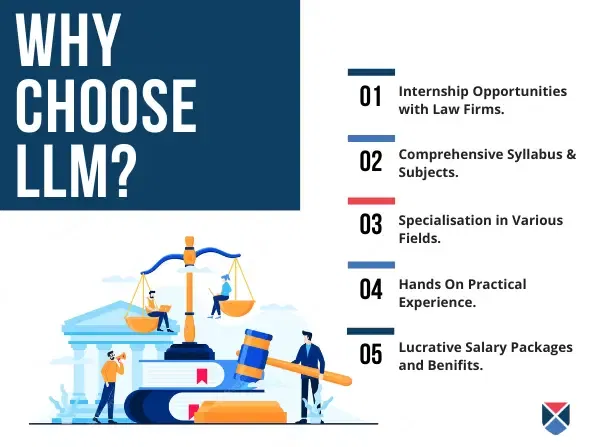
Eligibility Criteria for LLM
For admission into the LLM course, aspirants must have met the eligibility requirements chartered by the University of Grants Commissions and Indian Bar Council. Students must complete their undergraduate degree with a minimum aggregate of 50% from a recognized university. Apart from that, selective universities conduct entrance exams for admissions, for which, aspirants are required to clear with a good percentile. The minimum age to apply for the course is 21 years.
How To Get Admission to LLM?
The admission process for the LLM course is done based on the LLM eligibility criteria set by respective universities guided by UGC and the Indian bar council. LLM admission is done only via merit-based quota and there are no seats under the management quota. In any LLM specialization, aspirants interested in pursuing a specialized degree must have completed their bachelor's law degree with an aggregate score over 50% and should've cleared entrance exams prescribed by selective universities.
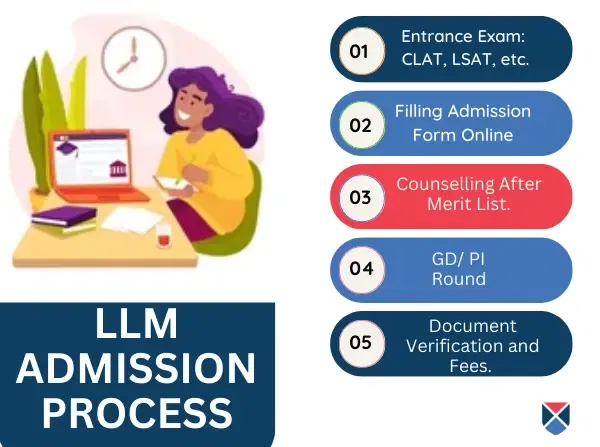
The admission requirements differ based on the domain and the college's reputation. Listed below are the steps for the admission process in general:
Apply For the Course
The aspirants can either apply online or offline for the desired institution. COVID-19 has forced universities to conduct admissions online. Students are needed to log in to the official website of the university and fill in the necessary details.
Selection Criteria
The selection criteria are based on the cutoff scores. The university cutoff score is the aggregate of entrance exam scores and undergraduate scores. Aspirants eligible for admissions are called for personal interviews before seat allocation. The personal interview is conducted to test aspirants' willingness and knowledge of the specialization.
LLM Courses
LLM courses are offered either as full-time courses, distance LLM courses, and online-based learning LLM courses. Law is applicable everywhere, and there are separate sets of laws governing every jurisdiction. The diverse jurisdiction requires specialized legal personnel to handle cases in that domain and establish legal authority. Listed below are the top LLM specializations in India:
- LLM International Law
- LLM Corporate Law
- LLM Business Law
- LLM Criminal Law
- LLM Trade Law
- LLM Taxation Law
- LLM Environmental Law
Other popular LLM specialisations are listed below:
| S.No | LLM Course List |
| 1 | LLM Insurance Law |
| 2 | LLM Jurisprudence |
| 3 | LLM Family Law |
| 4 | LLM Human Rights |
| 5 | LLM Healthcare and Medicinal Law |
| 6 | LLM Intellectual Property Law |
| 7 | LLM Fashion Law |
| 8 | LLM Sports Law |
| 9 | LLM Information Technology Law |
| 10 | LLM Air and Space Law |
| 11 | LLM Cybersecurity Law |
| 12 | LLM Legal History |
Popular Entrance Exams for LLM
The LLM course details can be found online. The entrance exam is conducted in the form of an online written test. There are several national and state-level entrance examinations affiliated with several universities. Apart from that, selected universities conduct a university-level examination for the admission process, apart from national-level examinations.
The questions asked for the examination are specialization-oriented. A percentage of questions can be expected from fundamental law and constitutional sciences. Admissions are offered based on the examination scores secured by the student along with the university cutoff. Some of the popular LLM entrance exams are listed below:
A Quick Glance at the LLM Entrance Exams
Entrance exams are mandatory criteria for LLM admissions. The exam pattern for specified LLM courses is institution-specific and varies from one conducting body to another. The standard format for the entrance exam is listed below:
- The exam pattern consists of questions from fundamental law and constitutional sciences.
- The duration of the examination is usually from 2-3 hours.
- The syllabus, mode of examination, and question pattern may change according to the conducting university.
- The number of questions asked varies from 90-150, depending upon the conduction body.
Top LLM Colleges in India
Apart from state-recognized law schools, several universities are offering LLM courses in India. Below listed are the top colleges that NIRF ranks:
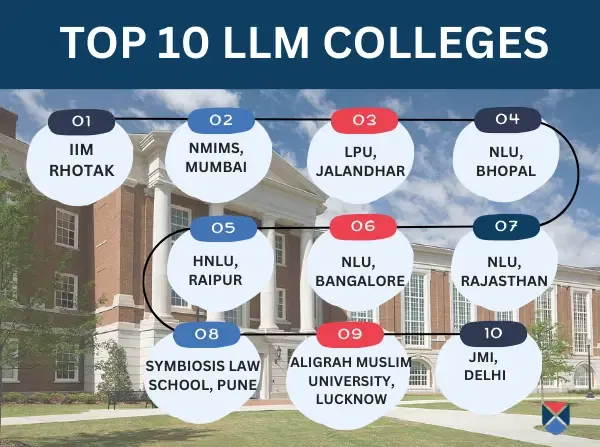
Fee Structure for LLM
LLM is a postgraduate law degree with a varied duration. LLM duration in India may range from 1 to 2 years of study, depending on the university that offers the course. The average LLM fees range from INR 2 to 5 LPA. Some of the LLM colleges are listed below according to their fees structure:
| Colleges | Fees Structure |
| National Law University | INR 2 LPA |
| Symbiosis Law School | INR 1.2 LPA |
| Panjab University | INR 50,000 |
| Indian law Institute | INR 1 LPA |
| The West Bengal National University of Juridical Science | INR 1.75 LPA |
Syllabus and Subjects for LLM
LLM is an internationally recognized postgraduate degree. The syllabus for LLM entirely depends on the area of specialization one chooses to pursue. Apart from the specialization subjects, there are some fundamental legal procedure subjects in UGC's curriculum. The syllabus offers in-depth knowledge and nuances of specialized law domains along with essential law practice.
Apart from theoretical subjects, LLM also helps students to attain good law practice and experience. This course offers practical insight into different law fields as the course promises high-level specializations and educates aspirants about the latest legal changes in various systems. Apart from specialized law, LLM also facilitates the practice of international law in selected nations. Some of the subjects that are included in the LLM syllabus are:
- Law and Social Transformation
- Jurisprudence
- Constitutional Law
- Law Relating to Labour Welfare
Read More about LLM Syllabus and Subjects
What is LLM All About?
An LLM course duration is for two years and offers a study of imparting quality legal education with an understanding of the constitution and legal system functions under various jurisdictions. The degree provides the aspirants with all the knowledge required to handle cases in a specialized domain, along with adequate legal practice. LLM coursework consists of basic subjects like law and social transformation in India, and jurisprudence LLM is one of the premium law degrees that prepare the students from a base level to handle problems associated with specialized domains.
What Does an LLM Graduate Do?
Listed below are the various job functionalities of an LLM graduate:
- Case Research: Working as lawyers, graduates need to research and produce factual points for their client's claims. Graduates need to have a good research approach to unravel the truth behind the case.
- Legal Consultation: Offer necessary legal consultation for several industries and organizations. Also, warn their clients about potential jurisdictional changes.
- Presentation and legal battle: Graduates of this course need to have a strong representation of their clients in the courtroom. The arguments present should have factual accuracy and should not offer a legal loophole.
- Jury Consultation: Experienced graduates are called upon for an annual legal summit where legal loopholes are identified, and proper solutions are offered.
Reasons Why LLM can Fetch you a Rewarding Career
LLM graduates have higher job scopes than LLB graduates owing to their specialized knowledge. LLM graduates are bound to have a more stabilized job market than LLB. Having an LLM degree with strong technical skills can fetch job opportunities across the world. Listed below are the reason why the LLM course is a boon for graduates:
- Demand: LLM offers graduates a thorough understanding of a particular domain's legal jurisdiction, making them experts in handling a specified portfolio. There has been a massive increase in demand for specialized lawyers at the corporate level.
- Diverse Career Opportunities: LLM provides a wide range of career opportunities worldwide. Graduates are entitled to have options across various legal domains, ensuring a fruitful career ahead.
- Higher payscale: Lawyers and advocates with a specialized master's degree are high in demand, which directly increases their average pay scale. Graduates are bound to earn a pay scale ranging from INR 10-30 LPA.
Read More about LLM Jobs
Preparation Tips for LLM
Listed below are the preparation tips suggested for the LLM course:
Prepare for Exams: Have a study plan and cover all critical points while preparing. Understand the exam pattern and the examination syllabus to get the hang of a proper study plan.
Strengthen Your Fundamentals: The course requires the student to be more assertive in basic constitutional law and legal practice. A strong fundamental will help them to understand advanced concepts easily.
Legal Practice: During the coursework, it is advisable that graduates also do regular pro-bono or designated legal practices under the bar council. It will help them to apply the concepts pursued and further enhance their practical experience.
Update Regularly: To get a hold of new laws, students must keep themselves updated on jurisdiction changes. Students can follow the line via online magazines and newspapers.
Scope For Higher Education in LLM
LLM is not the limit for students who are willing to pursue more. Students who want to pursue higher education can do domain-specific certification courses. Graduates can also pursue a JD (Doctor of Judicial Science) in their desired specialization. Some of the options of systems to pursue after LLM are listed below.
- Doctor of Judicial Sciences
- Post-Graduate Diploma Certification in International Law
- American Bar Administration Paralegal Program
LLM Salary
The average salary for an LLM graduate ranges from INR 8 - 20 LPA depending on the specialization and domain. Career growth is based on experience and technical knowledge in the domain.
Read More about LLM Salary
Career Options After LLM
LLM course offers diverse job scopes adhering to the specialization pursued. Graduates are entitled to receive offers from reputed organizations across India and worldwide, promoting an international career.

LLM course helps aspirants to be certified professionals in their work area. Some of the career options available are:
- Advocate
- Legal Adviser
- Solicitor
- Research Associate
- Adjunct Professor
- High Justice
- Civil Service
Skills That Make You The Best in Law
Every industry is governed by a separate jurisdiction and requires talented legal personnel. In this chosen field, both experience and legal knowledge play a vital role in handling several clients to help graduates thrive in this career line. LLM helps aspirants to cement their superiority in the legal field. Some of them are:
- Communication Skills
- Research Skills
- Negotiation Skills
- Case Investigation Skills
- Time Management
- Qualitative Thinking
- Entrepreneurial Skills
- Client Management Skills
Top LLM [Master of Laws] Colleges
Top Law Entrance Exams
LLM Fee Structure
FAQs on LLM
Q: Can I do LLM without LLB?
Q: What is the salary after LLM in India?
Q: In which field LLM is best?
Q: What is the eligibility for the LLM course?
Q: What is the scope of LLM?






